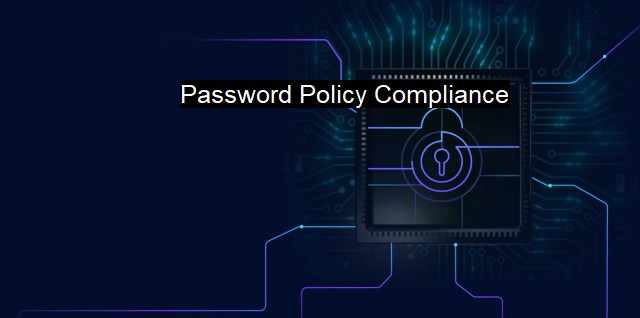What is Password Policy Compliance?
Ensuring Strong Password Policy Compliance: A Crucial Step Towards Cybersecurity in the Digital Age"
Password Policy Compliance in the Context of Cybersecurity and Antivirus
One of the key concepts that stand out is "password policy compliance," (PPC). This emphasizes the importance of secure password practices in order to protect data and systems from unauthorized access. PPC refers to company or individual adherence to specific guidelines when creating and managing passwords, in accordance with best practices for protecting digital security and privacy.
A fundamental aspect of PPC is the implementation and reinforcement of a robust password policy. This policy would typically incorporate a set of standards and rules developed by an organization or community, formulated and mandated for all constituents, concerning how password creation and management should be carried out. The policy may mandate minimum and maximum length for passwords; the inclusion of special characters, numbers, upper and lowercase letters; regular password changes; and abstention from re-using previous passwords.
PPC could be evaluated in terms of implementation adherence and its effectiveness. Adherence is determined by evaluating whether employees or system users are creating and managing passwords according to stated policies. Validating the effectiveness would entail assessing whether those adhering to the PPC are less likely to suffer data breaches and security threats.
In this realm, forming secure passwords is only a portion. Ensuring the same passwords are not used across different platforms is equally significant, along with showing duty when it comes to changing passwords when a potential breach is indentified. Password Manager software may aid in this initiative, to handle a large number of passwords without compromising security.
Where does antivirus intervention tie into this equation? Antivirus software is typically a program or set of programs that are designed to prevent, detect, and remove software viruses and other malicious software like worms, trojans, adware, and more, thereby enhancing cybersecurity.
Antivirus software usually protects against threats by scanning, identifying, and removing viruses. Some antivirus software also provides internet security functions which can include protection from phishing and hacking attempts. One way they do this is through identifying and alerting users to insecure online behaviour, such as navigating onto potentially dangerous websites that could inject malware into their systems.
A relationship linkage becomes apparent between antivirus software and the establishment of optimal password hygiene. Software regularly prompt users to change passwords and might help highlight poor password hygiene, such as password re-usage or
Easy-to-guess passwords. Therefore, an antivirus service can facilitate an establishment’s adherence to satisfactory PPC.
It is essential to consider the potentially catastrophic consequences of failing to uphold proper PPC. The exponential cyber risks, including data breaches resulting in compromised sensitive information, decreased customer trust, loss of future customers, potential regulatory fines and reputational risks are not to be disregarded lightly.
Proper password policy compliance, supported by reliable antivirus software, helps to form a formidable defense against cyber-attacks. Through the consistent and appropriate utilization of these practices and tools, we can substantially reduce the risk of potential data, financial, and reputation losses, whilst strengthening the security and privacy of our digital existence in this rapidly evolving world of cyber technology.
Password policy compliance is a central pillar in comprehensive cybersecurity strategy. Conversely, lack of adherence to password policies can increase the vulnerability of an individual or an organization to cyber-attacks. Particularly given the increasing sophistication of cyber threats, PPC buttressed by strong antivirus defenses not only protect against data breaches and other online threats, but also contribute to dictating the success of an organisation’s cybersecurity strategy.

Password Policy Compliance FAQs
What is password policy compliance, and why is it important for cybersecurity?
Password policy compliance refers to the practice of adhering to specific requirements and standards for creating and managing passwords. It is important for cybersecurity as weak or compromised passwords can easily be exploited by attackers and can result in the compromise of sensitive data, systems, and networks.What are some common elements of a password policy?
Common elements of a password policy include minimum password length, complexity requirements, password expiration and renewal frequency, restrictions on password reuse, and multi-factor authentication requirements.How can organizations ensure password policy compliance among their employees?
Organizations can ensure password policy compliance among their employees by establishing clear policies and guidelines, providing regular training and awareness programs, conducting periodic audits to check for compliance, and implementing technologies such as password management tools and multi-factor authentication solutions.What are the consequences of non-compliance with password policies?
Non-compliance with password policies can result in security breaches, data loss, regulatory violations, and reputational damage. In addition, non-compliance may also result in legal consequences and financial penalties, especially in cases where compliance is mandated by industry-specific regulations or government laws.| | A | | | B | | | C | | | D | | | E | | | F | | | G | | | H | | | I | | | J | | | K | | | L | | | M | |
| | N | | | O | | | P | | | Q | | | R | | | S | | | T | | | U | | | V | | | W | | | X | | | Y | | | Z | |
| | 1 | | | 2 | | | 3 | | | 4 | | | 7 | | | 8 | | |||||||